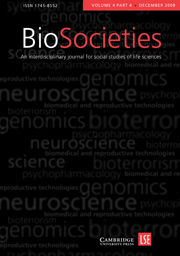Article contents
Biosocial Suffering: Order and Illness in Urban West Africa
Published online by Cambridge University Press: 05 December 2006
Abstract
In the medical literature in the United States and France, sickle cell trait (HbAS) is generally described as a benign condition. Curiously, however, people in Dakar, Senegal, and women in particular, complain of symptoms attributed to this trait, which most doctors in this part of West Africa diagnose as a moderate form of sickle cell anemia—a professional tendency that is now beginning to change. This article draws on ethnographic materials to understand Senegalese sickle cell trait suffering as an instance of social suffering mediated not only through cultural and biological forms, but also through cultural and biological ‘options’ to be sick. It examines the interplay of social distresses caused by sickle cell trait, and disease, diagnoses. It concludes that suffering attributed to sickle cell trait consists of a complex nexus marked by economic privations, social practices that are specifically gendered as female, religious fatalism and various ecological and environmental stressors. Theoretically, this article joins the concept of social suffering to that of biosociality. The resultant assemblage is ‘biosocial suffering’ whereby women with sickle cell trait articulate and manifest social and physical pains through the biological entity of this recessive allele.
- Type
- Articles
- Information
- Copyright
- 2006 London School of Economics and Political Science
- 22
- Cited by


